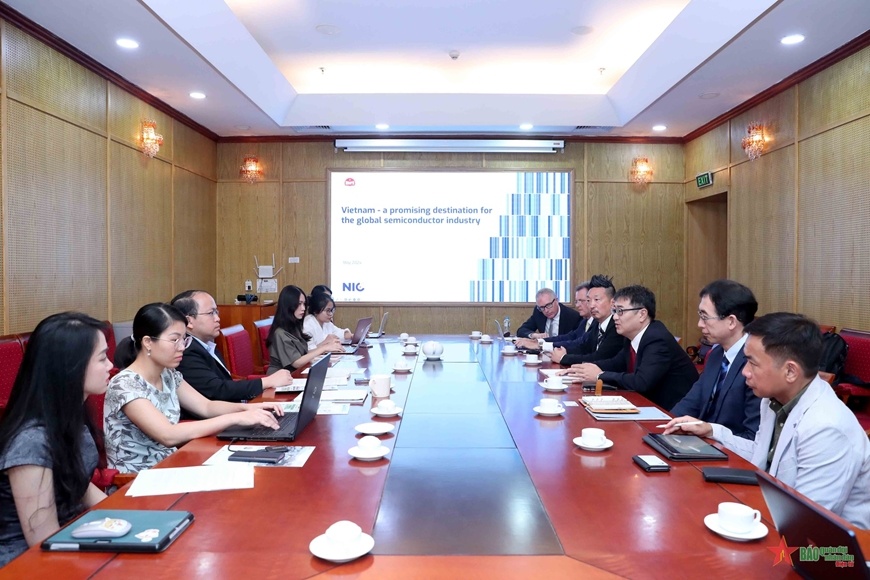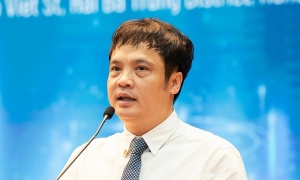NIC partners with Japanese and US schools to train semiconductor workforce
 |
The meeting, at the Ministry of Planning and Investment (MPI), focused on developing training programmes and scholarships for Vietnamese students.
Professor Shinji Kaneko, executive vice president for International Relations at Hiroshima University said, "Hiroshima University is partnering with the University of Idaho to offer a specialised four-year bachelor's programme in semiconductor studies, taught in English."
He explained that students will spend the first two years at Hiroshima University and the final two years at the University of Idaho, earning an engineering degree from the University of Idaho.
This programme is supported by Micron Technology, a leading multinational semiconductor manufacturer based in Idaho, US, with facilities in Hiroshima. Micron Technology provides faculty support, research labs, and advanced equipment for the programme.
Graduates are expected to have excellent career opportunities in the semiconductor industry in Japan, the US, and Vietnam. The scheme is scheduled to start in October 2026, pending approval from Japan's Ministry of Education, Culture, Sports, Science and Technology, and the Japanese government.
During the meeting, Hiroshima University proposed that Vietnam offer scholarships for at least 100–150 students, which could advance the programme's launch by one year.
Vu Quoc Huy, director of the NIC said, "NIC is currently focused on short-term training programmes (3–6 months) for developing the semiconductor workforce. Partnering with top universities from countries with advanced semiconductor industries is essential for implementing long-term training programmes."
The NIC plays a crucial role in promoting and facilitating high school and university students in Vietnam to apply for scholarships at Hiroshima University and the University of Idaho.
"With the global advancement of science and technology, NIC hopes to collaborate closely with Hiroshima University and the University of Idaho in the semiconductor field," Huy added.
Professor Kaneko emphasised the importance of long-term collaboration between universities and businesses, stressing the need for joint efforts in scholarship provision and connecting students with future job opportunities. This aligns with Vietnam’s broader goal of advancing its semiconductor industry, which is critical for high-quality human resource development.
Vietnam’s collaboration with prestigious global universities in semiconductor training is essential, aligning with the country’s strategic priorities and the strengths of each partner. This partnership aims to achieve the target of having at least 50,000 engineers and bachelor's degree holders in the semiconductor industry by 2030, involved in all stages of the value chain - from design to packaging and testing.
 | Hanoi eyes semiconductor industry growth with new strategic initiatives Experts have emphasised Hanoi's potential to become a key player in the semiconductor industry, leveraging new legal frameworks and strategic investments to attract global tech companies and foster local innovation. |
| Vietnam, Korean firms see high potential for collaboration in IT/semiconductors: survey Entrepreneurs of Vietnam and the Republic of Korea (RoK) have defined information technology and semiconductors as the most promising areas for future economic cooperation between the two countries, according to a recent survey conducted by the Korea Chamber of Commerce and Industry (KCCI). |
What the stars mean:
★ Poor ★ ★ Promising ★★★ Good ★★★★ Very good ★★★★★ Exceptional
 Tag:
Tag:
Related Contents
Latest News
More News
- Vietnam forest protection initiative launched (February 07, 2026 | 09:00)
- China buys $1.5bn of Vietnam farm produce in early 2026 (February 06, 2026 | 20:00)
- Vietnam-South Africa strategic partnership boosts business links (February 06, 2026 | 13:28)
- Mondelez Kinh Do renews the spirit of togetherness (February 06, 2026 | 09:35)
- Seafood exports rise in January (February 05, 2026 | 17:31)
- Accelerating digitalisation of air traffic services in Vietnam (February 05, 2026 | 17:30)
- Ekko raises $4.2 million to improve employee retention and financial wellbeing (February 05, 2026 | 17:28)
- Dassault Systèmes and Nvidia to build platform powering virtual twins (February 04, 2026 | 08:00)
- The PAN Group acquires $56 million in after-tax profit in 2025 (February 03, 2026 | 13:06)
- Young entrepreneurs community to accelerate admin reform (February 03, 2026 | 13:04)



















 Mobile Version
Mobile Version